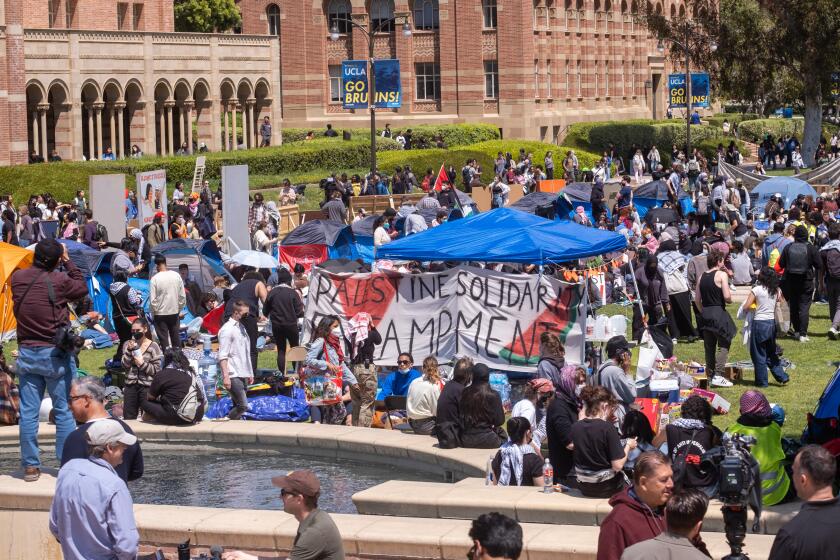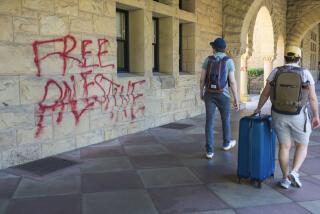Police arrested hundreds of pro-Palestinian students in L.A. The fallout continues
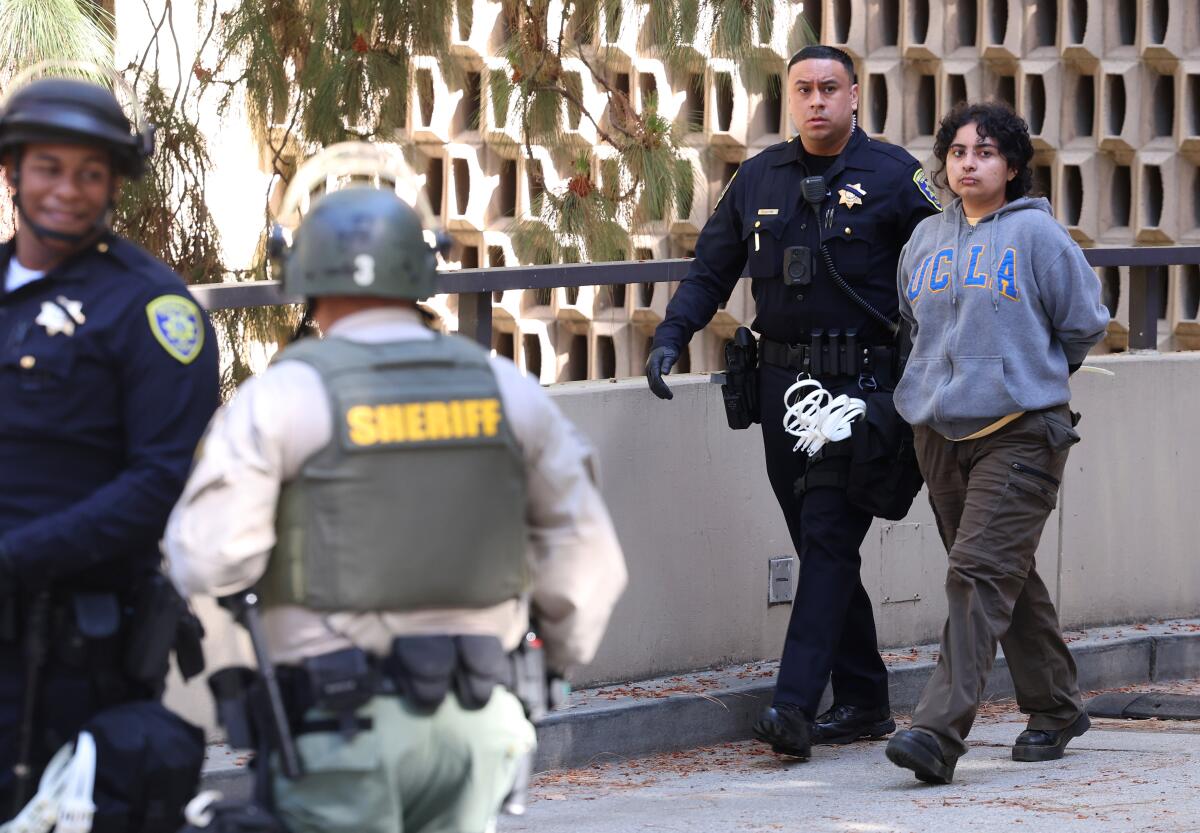
- Share via
Since police arrested her twice this spring at UCLA — accusing her of failing to obey orders to leave pro-Palestinian encampments — Asil Yassine has spent the summer navigating court dates and uncertainties.
No criminal charges have been filed in one case, although it has not been dropped. In the other, an arraignment is coming up in late August. The consequences of her arrests are piling up.
Yassine was temporarily banned from campus and could not attend her graduation, where she would have received a doctorate in human development and psychology. The university placed holds on her records and she still has not received her diploma. Without proof of her degree, her work this summer at a psychology office won’t count toward her license.
“I’m not surprised by the oppression but I’m shocked by the extent and aggression of it and how punitive it was,” said Yassine, who is of Palestinian and Lebanese heritage.
Some 3,200 people were arrested at colleges and universities nationwide this spring, mainly during a wave of pro-Palestinian encampments erected by students and activists protesting the war in Gaza, according to an Associated Press survey of students, universities and district attorneys. Some of the largest demonstrations and arrest tolls unfolded in California, including at UCLA and USC, where students demanded universities divest from financial ties to Israel. More than 100 demonstrators were arrested at campuses including Columbia University in New York, Emerson College in Boston and the University of Massachusetts Amherst.
Many students have already seen charges dismissed. But cases remain unresolved for hundreds of people at campuses with the highest numbers of arrests, according to an analysis of data gathered by The Times, the Associated Press and other newsrooms that partnered in the research.
About three months since 231 UCLA protesters were arrested, most on misdemeanor charges, the Los Angeles city attorney’s office has not received referrals involving those cases, a spokesman said. The city attorney typically handles misdemeanor charges. There is a one-year period in which charges can be filed in misdemeanor cases.
A spokeswoman for the county district attorney’s office, which works on felonies in the city of Los Angeles, said UCLA cases “are currently under review” and no further information was available.
Citing student privacy, a UCLA spokesman said the university could not discuss its internal student conduct proceedings.
The UCLA arrests occurred over a six-week period in May and early June. An additional 44 — some of them in possession of metal poles, padlocks and a printed “do it yourself occupation guide” — were arrested in a parking garage on suspicion of planning to overtake a campus building as part of the protests.
Three of those arrested at the parking lot were released due to “insufficient grounds for making a criminal complaint,” according to the UCLA Police Department, which said in a statement that it is working with the district attorney’s office on all cases that involved arrests.
Law enforcement authorities are still investigating those who instigated violence at the encampment on April 30 and May 1. One arrest was made in the attack.
Along with the legal limbo of those arrested, many students face uncertainty in their academic careers as they confront confidential university disciplinary proceedings.
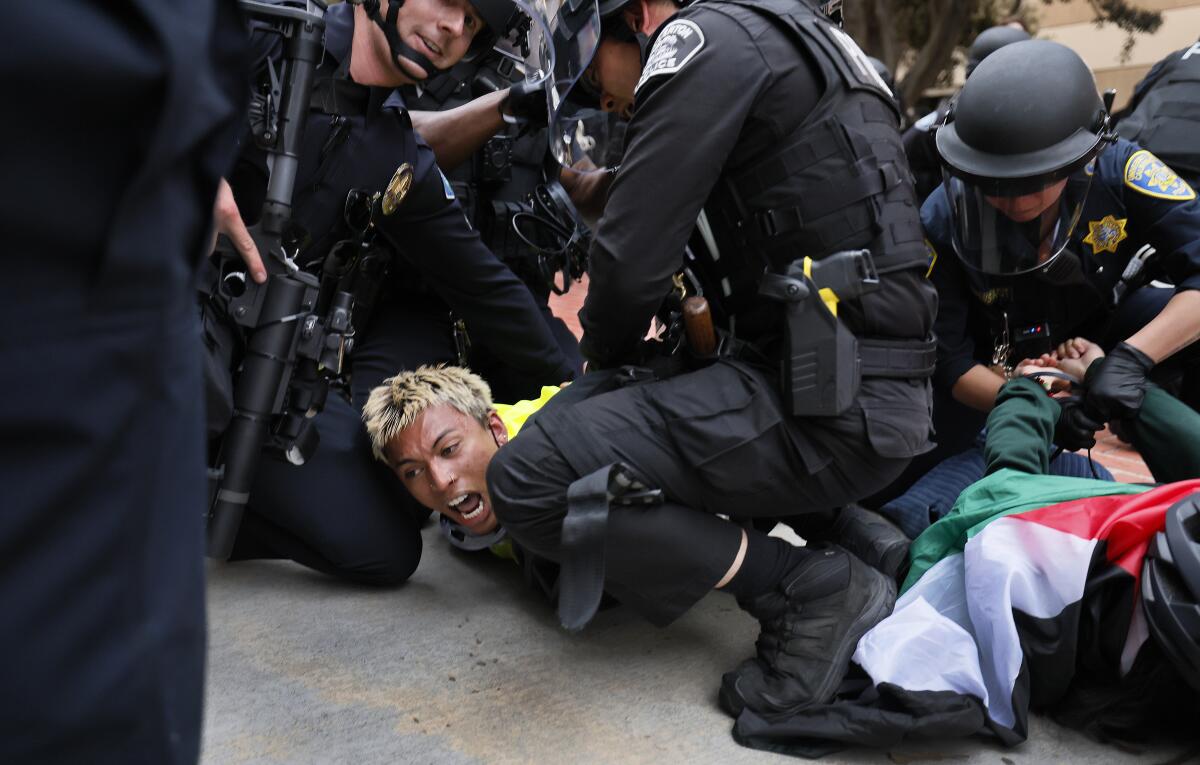
Some remain steadfast, saying they would have made the same decisions to protest even if they had known the consequences. Others have struggled with the aftermath.
“For me, the process with the university has been the hardest,” said Yassine, who was among 206 people arrested for failure to disperse on May 2, less than two days after vigilantes attacked the UCLA encampment. She was also among 25 people arrested on June 10 after joining another short-lived encampment.
Yassine signed an agreement with UCLA to not violate its policies again, which lifted the hold on her records. But she still has not received her diploma or transcript.
“I don’t think the arrests will lead to charges against me but the cases are still in limbo over my head,” Yassine said. “But the degree issue will set back my license by at least six months.”
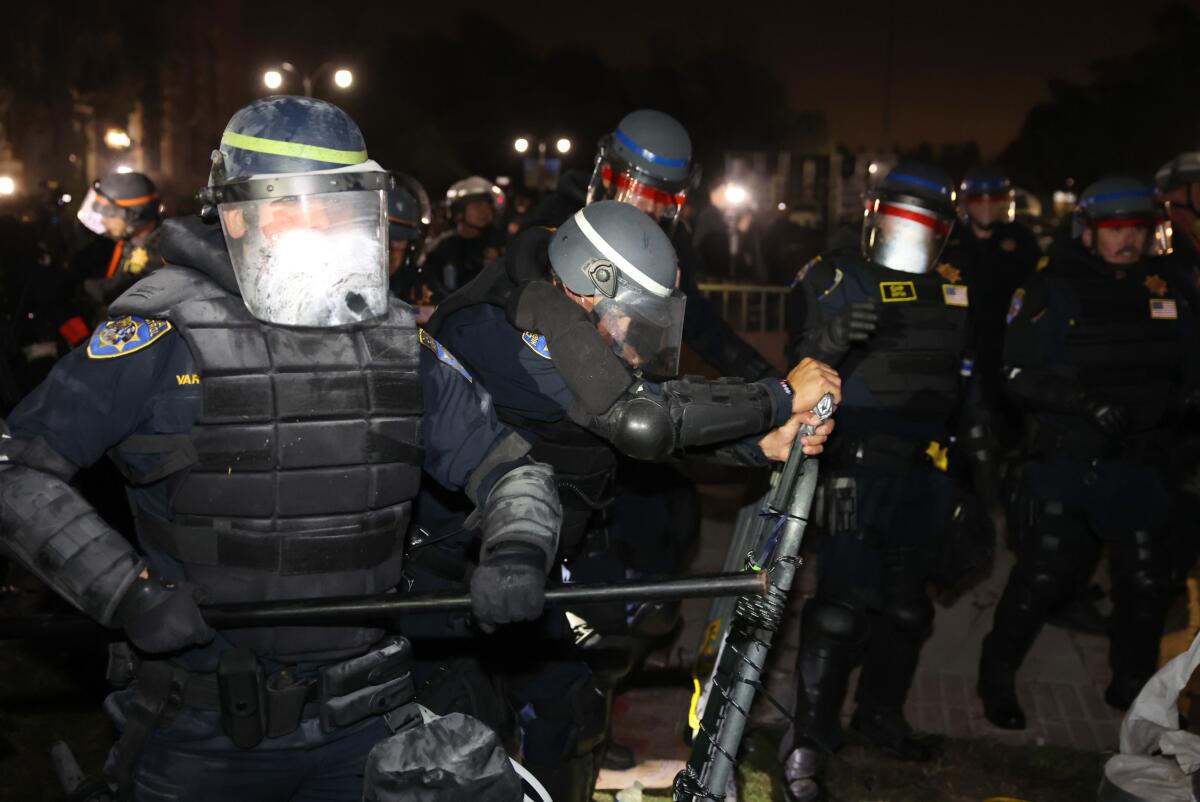
Across the nation, students who were arrested have similar experiences.
In St. Louis, Valencia Alvarez is waiting to hear what will come of the potential charges she and 22 other students are facing for an April 27 protest at Washington University. Campus conduct hearings began recently but have yet to result in disciplinary decisions. In the meantime, Alvarez does not have the master’s degree in public health she would have received by now if not for her arrest.
In June, the university gave students two options: They could face a hearing with the Office of Student Conduct, or they could “accept responsibility” and forgo further investigation. Alvarez took the first option.
“I don’t really plan on being quiet about this, and I think that’s the goal of the second option,” Alvarez said.
As students return this fall, colleges are bracing for more protests over the Israel-Hamas war and are strategizing over how to handle protests, including when to call in law enforcement.
Rich Leib, outgoing chair of the UC Board of Regents, says encampments should be banned, but protests that follow campus rules are welcomed as free speech. Many regents, senior leaders agree.
At University of California campuses, administrators have signaled that they will be less tolerant of encampments and other protests that violate campus policies. UC President Michael V. Drake is expected to draft a systemwide plan to bring all campuses into conformity about how to respond to violations of rules around protest. California lawmakers are holding back $25 million in state funding until Drake delivers a report on the efforts by Oct. 1.
Which charges are worth pursuing?
The vast majority of the cases against the demonstrators — including students, faculty and people without any ties to the colleges — involve misdemeanors or lower-level charges, including trespassing, disorderly conduct and resisting arrest, according to AP’s review of data on campuses with at least 100 arrests.
At USC, the LAPD arrested 93 people — 51 of them students — on April 24 while clearing a pro-Palestinian encampment in Alumni Park. Protesters were cited for trespassing after failing to follow police orders to disperse.
Citing privacy, USC declined to disclose details of student conduct investigations. But about 180 faculty and staff members sent a letter to USC administrators last month calling proceedings by the USC Office of Community Expectations “aggressive” and demanding “reforms” and “greater transparently” around cases involving student protesters. Students who were arrested said they attended arraignments earlier this year, although no charges have been filed.
Arrests from USC were “still under review,” Ivor Pine, a Los Angeles city attorney’s office spokesman, said in an email. There currently are no open cases regarding those arrested at USC, Venusse Dunn of the district attorney’s office said in an email.
Charges are also still unclear for the more than 40 people arrested on May 15 during a protest building occupation at UC Irvine, largely on suspicion of trespassing or failure to disperse after police orders.
“We have not made any filing decisions yet as our team is still reviewing the evidence,” said Kimberly Edds, a spokeswoman for the Orange County district attorney.
It’s been a different outcome for 19 people — nine of them Pomona College students and others from Scripps College and Pitzer College — arrested during an occupation of the Pomona College president’s office building on April 5. On July 8, the district attorney charged each with trespassing and refusing to leave private property. An arraignment is scheduled for Aug. 23 in L.A. County Superior Court in Pomona.
James Gutierrez, an attorney for the students arrested at Pomona College, said they plan to accept a diversion offer that requires the students to perform 16 hours of community service over six months in exchange for the cases being dismissed.
Students who faced interim suspensions in April are close to completing the student conduct judicial process, according to a Pomona College spokeswoman.
Prosecutors in several other U.S. cities are still evaluating whether to file charges. But in many cases, officials have indicated they do not intend to pursue low-level violations, according to AP’s review.
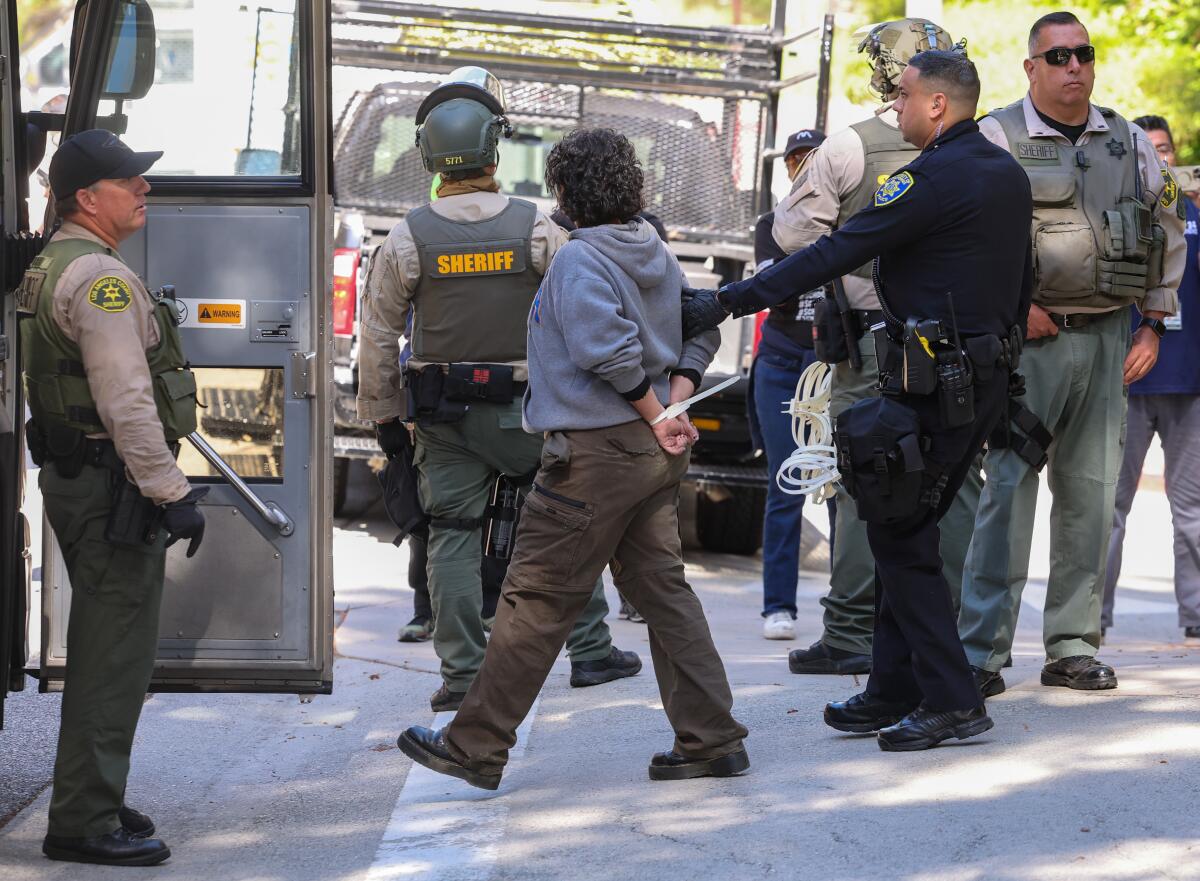
In Northern California, the Humboldt County district attorney said this week that she would drop charges against the majority of protesters “based upon insufficient evidence to prove a crime beyond a reasonable doubt and/or interests of justice grounds.”
In an emailed statement, Dist. Atty. Stacey Eads said that, out of 39 people arrested by the Cal Poly Humboldt Police Department, she rejected charges for 27. The rest of the cases, she said, were pending further investigation and information submission by the college’s police department.
For some students, the consequences for their academic careers have affected them more than any legal jeopardy.
Alvarez, who hopes to branch into social justice and community organizing, said she doesn’t have regrets. But that’s not to say the protest didn’t come at a cost.
“I want that degree,” Alvarez said. “I worked four jobs throughout my two years at Wash U to be able to afford tuition without pulling out any loans.”
Yassine, the UCLA psychology doctoral graduate, also said she was proud of the encampments. She believes she protested for the right cause, no matter the consequences.
“I’m never surprised by the repression of speech in favor of Palestinian liberation and human rights,” she said. “That has been true since the day I was born.”
“I’ve been concerned all summer long about my cases, degree and licensing. But that issue is nothing compared to what is happening in Palestine.”
Kaleem is a Times staff writer. Obradovic is a reporter for the St. Louis Post-Dispatch. The Associated Press contributed to this report.
More to Read
Sign up for Essential California
The most important California stories and recommendations in your inbox every morning.
You may occasionally receive promotional content from the Los Angeles Times.
